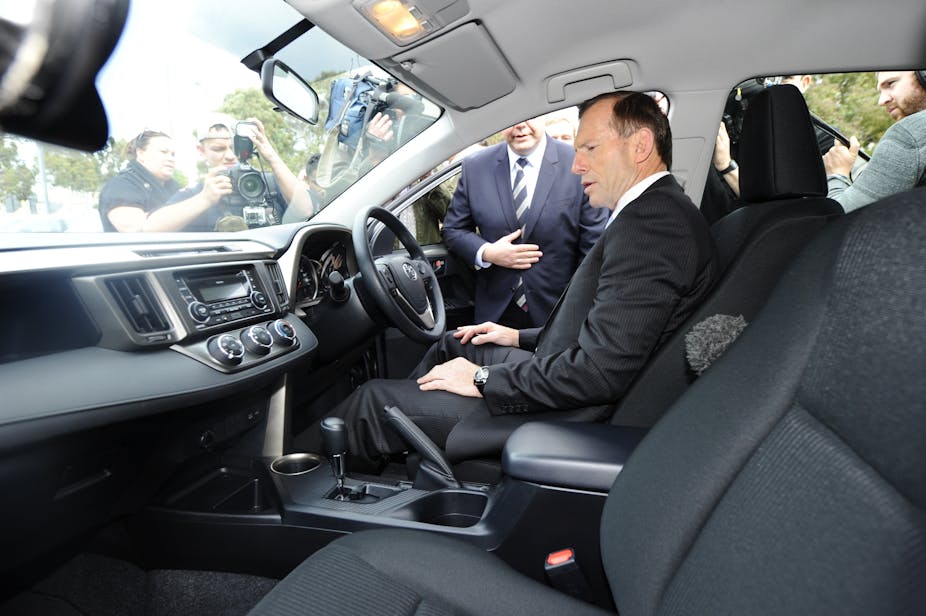The Productivity Commission will today release the preliminary report of its inquiry into Australian automotive manufacturing industries, ensuring the future of car manufacturing in Australia continues to dominate the news cycle.
The car maker’s move to cease its operations in Australia after 60 years leaves Toyota the “last man standing”. The Federal Court’s decision to block Toyota from holding a ballot considering changes to its workplace agreement has led to even more speculation about the sector’s viability. (Toyota has since appealed.)
Many commentators have highlighted the benefits car manufacturing brings both in terms of employment, direct and indirect, as well as investment in research and development. But opinions are split when considering the way forward: is it assistance packages? An “employer-friendly” IR system that allows flexibility? Approaching the workers “as equals” and including them in decision-making? Investment in innovation?
The most probable answer is that a little bit of everything is needed. There are spillover effects that need to be taken into account when deciding whether to continue with assistance packages for car manufacturers. There’s also a need for agility in the workplace: organisations (car manufacturers and others) need to keep abreast of changes in their sectors and build capabilities that allow them to respond to environmental changes.
Combative approach needs to change
Unfortunately there’s an “us versus them” assumption underpinning the existing Australian IR system - one that needs to change in response to 21st century needs.
The Australian industrial relations system has always been premised on the basis of collective bargaining, and in recent years, enterprise agreements. The major limit of collective bargaining is it focuses on wages and conditions of employment, rather than the value-add component of the employment relationship.
The current Fair Work Act provides little in the way of guidance for employees, unions and employers to adapt to a more high involvement management strategy, incorporating the ideas and views of employees to fully utilise their capabilities.
The current dispute at Toyota exemplifies the skewed focus of the IR system as well as its rigidity in times where agility is paramount. The recent decision by the Fair Work Commission requiring Toyota management to further consult its workforce does provide some recognition that a more consensus-based approach is required.
The focus on Toyota’s efficiency drive through the enterprise bargaining process is only part of the answer. A more integrated approach using a high involvement management strategy incorporating new systems and procedures that allow workers to have a say in the workplace could provide far greater value in the medium to longer term.
The future for manufacturing
There is a future for manufacturing in Australia, but it is not in large scale car manufacturing. Holden’s closure and the implications it might have for Toyota are significant, with a pressing need to look to alternatives to employment in car manufacturing.
Glenn Cross, the COO of AusBiotech, an industry organisation for companies in the biotechnology sector has said the medical devices and diagnostics sector “has the ability to absorb skills from the automotive industry as well as add a new manufacturing and skills base through areas like nanotechnology, biomaterials and small-scale manufacturing”. How can that be facilitated?
Further, according to the latest report from the Australian Food and Grocery Council, there is tremendous opportunity for food exports given the “westernisation” of diets in Asia, an increasing demand for ready-made/easy-to-prepare meals and a desire for safe food products. The food, beverage and grocery manufacturing sector employs approximately 300,000 people – how can their jobs be protected and how can we add more?
Belgian think tank the Lisbon Council has discussed “the rise of the micro-multinational” drawing on the case of New Zealand micro-manufacturer Ponoko which “pioneered the creation and exchange of downloadable products” via 3D printing. Through Ponoko, customers can arrange to have their products manufactured and delivered anywhere in the world, with low costs, less complexity and instant scalability. How can we encourage such entrepreneurial thinking to create jobs in micro-manufacturing?
With the imminent closure of Ford and Holden, we are witnessing the end of an era for Australian car manufacturing. Finding long-term solutions to the complicated “what’s next” question is premised on a collaborative approach between all relevant stakeholders (government, unions, and employers).
The task force that will work out where to spend the government’s A$100 million Holden assistance package will need to decide which subsectors show promise for growth; what support they need and; how to upskill manufacturing workers to be able to find employment in those sectors.

